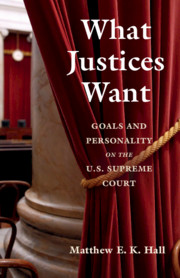Book contents
- Frontmatter
- Dedication
- Contents
- List of Figures
- List of Tables
- Acknowledgments
- 1 Who They Are and What They Want
- 2 Goals and Personality
- 3 Measuring Justice Personality
- 4 Agenda Setting
- 5 Opinion Assignments
- 6 Intra-Court Bargaining
- 7 Voting on the Merits
- 8 Separate Opinions
- 9 Behind the Black Robes
- Appendix A Agenda-Setting Analysis
- Appendix B Opinion Assignment Analysis
- Appendix C Intra-Court Bargaining Analysis
- Appendix D Voting on the Merits Analysis
- Appendix E Separate Opinion Analysis
- Notes
- Index
2 - Goals and Personality
Published online by Cambridge University Press: 22 August 2018
- Frontmatter
- Dedication
- Contents
- List of Figures
- List of Tables
- Acknowledgments
- 1 Who They Are and What They Want
- 2 Goals and Personality
- 3 Measuring Justice Personality
- 4 Agenda Setting
- 5 Opinion Assignments
- 6 Intra-Court Bargaining
- 7 Voting on the Merits
- 8 Separate Opinions
- 9 Behind the Black Robes
- Appendix A Agenda-Setting Analysis
- Appendix B Opinion Assignment Analysis
- Appendix C Intra-Court Bargaining Analysis
- Appendix D Voting on the Merits Analysis
- Appendix E Separate Opinion Analysis
- Notes
- Index
Summary
Explaining the behavior of US Supreme Court justices requires an understanding of the justices’ goals. That is, in order to understand what justices do, we must understand what justices want, and what justices want depends on who the justices are. I start from the premise that judges are real people, not legalistic automatons or single-minded ideologues. As such, they are motivated by multiple goals. That is, when justices make decisions, they care about more than one objective, and they make decisions with those multiple objectives in mind. Moreover, because judges are people, they are motivated by many of the same goals that motivate most people in their personal and professional lives.
For example, consider a group of college students enrolled in a typical academic course. What do the students want? Most students probably want to succeed in the course, although different students may have different ideas of what success means – some students may want an “A”; others may be content to pass. But they have other desires as well. Most students would prefer to learn interesting material rather than study a dull topic. Some students hope to impress the professor and earn a letter of recommendation. Others may enjoy interacting with their classmates in discussions and group projects. Some may even want to meet new friends through the class. And, of course, every student probably wants to limit the amount of time and energy they devote to the course so they can work on other courses, participate in extracurricular activities, and enjoy leisure time. In short, college students pursue multiple goals; therefore, any time students make decisions, multiple motivations influence their choices. When selecting a partner for a class project, a student might consider their potential partner's intelligence, scheduling availability, or even sense of humor because each of these qualities may help the student achieve various goals, such as academic success, convenience, or enjoyment.
The same principle applies to Supreme Court justices. Of course, given the Court's elite and exclusive status, the justices likely share more similarities than students in a random college class.
- Type
- Chapter
- Information
- What Justices WantGoals and Personality on the U.S. Supreme Court, pp. 13 - 34Publisher: Cambridge University PressPrint publication year: 2018

